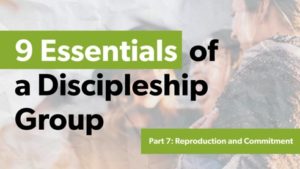The Jesus Paradigm
This is part of The False Promise of Discipleship blog series from The Bonhoeffer Project. Read the blog that came right before this one by clicking here.
Rather than building on sand, the wise builder asks, “Hey, is there a rock around here?”
Jesus demolishes The Human Paradigm and replaces it with something wonderful and glorious, dazzling and brilliant. The Jesus Paradigm (of life inside His Kingdom) looks something like this:
X still marks the spot, but the X is territory claimed by the cross of Jesus. The difference is that there are no rungs because, in Jesus’ view, we are already there. “You’re in,” Jesus says. It’s done. You’ve been adopted.
This is not the economy of The Human Paradigm, where “you eat what you kill.” Earning by human standards does work in our world exactly as described in The Human Paradigm. But grace! Grace—which drives the Kingdom of God—does not run on the gas of earning, competence or merit. Grace stands in complete contrast to our merely human ways of doing things, which is why we call it amazing. We don’t come by strength; we come by being weak and acknowledging that weakness. Paul called it “rejoicing in grace” (Phil. 1:18).
In Jesus’ paradigm, our awareness of what Jesus has already done and the humility to see and receive it is missing. We earn nothing; we just learn to abide. We become okay with not arriving. That’s what abiding is all about: not arriving. Our labor is not to earn, but to surrender to what Jesus has done. This is a sort of dying, what Jesus calls “being born again.” He knows that trying really hard is actually not how spiritual growth happens. Transformation happens when we learn that our best efforts aren’t going to get us there, and that God was never interested in our best efforts in the first place! It’s the very reason the scriptures tell us to “labor to rest” (Heb. 4:11).
What a paradox! Laboring to rest means coming into a completely new understanding of God’s economy of grace. Going to conferences and reading books may be great things, but the reality is that the earliest disciples were not invited into seminaries or systematic theologies or endless study. They were simply invited into a full awareness of who Jesus was and the Father whom Jesus reveals. If you’re aware of this, if you become fully aware of just how good, generous, and near God is—then everything—every thing—will take care of itself. As we like to say,
Bill Hull and Brandon Cook, authors of this blog and eBook, will be teaching at this year’s Forum. Meet them and get more content like this in person at the 2017 National Disciple Making Forum.
This is one of the largest gatherings of disciple makers in North America with 65+ workshops, 15+ speakers, and 10+ tracks. Join us to learn practical ways to make disciples of Jesus this November 9-10 (Thursday-Friday). Register for the 2017 National Disciple Making Forum here.
“Follow Jesus and He will teach you everything you will ever need to know.” Love takes care of it all. It’s no wonder then that Jesus defines eternal life, very simply, as knowing the God of love. Not knowing about Him, but knowing Him in the way you would know an intimate friend, a confidant, a spouse.
Our minds cannot readily grasp that God would so humble Himself as to have mutuality and a reciprocal “knowing” in His relationship with us. But that’s the very mutuality revealed in Immanuel, God with us. Further, Jesus so easily worked acts of power and grace because His feet were always rooted in the waters of the Jordan, even when they were dry. He always lived in that place where God said to Him (again, paraphrasing), “You are in. You are my beloved. I’m proud of you.” Jesus knew that He was “in,” and because of that, He could bestow that “chosenness” on others. Everything good flows from knowing the “you’re in” that God speaks over us. It’s what Jesus came to adopt us into.
A disciple, then, is someone who, grounded by grace and guided by the Holy Spirit, is increasingly rooted in an understanding and experience of how generous God is—and how God has given us a new identity based not on our performance but on His profligately generous acceptance.
But! We know this is nonsense. Everyone knows that Santa brings presents to only good boys and girls, and at a core level most of us remain comfortable relating to Jesus like Santa Claus. A Santa Claus we can control. There’s just no space for thinking that we—broken, sinful, selfish people—could be adopted in and brought to the table, accepted. And it’s this very unwillingness to receive that allows us to stay in control. Like the tragic character Javert in Les Miserables throwing himself off a bridge because he can’t accept the reality of grace, we have to wrestle with something that is completely offensive and insane to our merely human minds. This is why grace is so hard: It is an offense to our survival mechanisms and to every system of reward and punishment by which we’ve survived life. We are simply unready and untrained for grace. And so we drift back to The Human Paradigm and its mighty gravitational pull. We shrink the gospel to something we’re more comfortable with, something less offensive to our egos, something within our power to control. That way, we’re never confronted with the tension of needing to be humble enough to receive God’s gift or to focus on the Giver rather than ourselves.
I (Brandon) find that as much as I know about grace, there is some part of me—no doubt it’s what the Bible calls my flesh or ego—that does not want to submit to God or even be touched by Him. I’m always seeing how I can try to do the dance better, which must be more appealing to me than just saying, “Wow, I don’t get it, but thank you.” I’m always thinking I can’t approach Jesus if I’m not in a good space, if I’ve not been “doing well” (whatever I think that means). Again, where’s the focus in that thinking? On me! Certainly not on God. And not on others.
In short, if we live outside of Jesus’ paradigm, our energies will always drift back to focus, even obsession, on the question, “How am I doing?” But Jesus wants to redirect our energies! Of course, we get exhausted if our best discipleship processes are just rehashes of The Human Paradigm in the latest, hippest garb. This was never Jesus’ intent for us. His goal was never to get us to try really hard—but that we should learn to abide and reorient our lives around loving and serving others. That commitment to reorientation of life and energy fuels our transformation into the image of Jesus.
*Stay tuned by coming back to our blog for the next blog in this series, which will be coming soon!
This is an excerpt from the free eBook written Bill Hull and Brandon Cook of The Bonhoeffer Project. You can download the full eBook on their homepage here.
Bill Hull is a Co-Founder of The Bonhoeffer Project. Bill’s passion is to help the church return to its disciple making roots and he considers himself a discipleship evangelist. This God-given desire has manifested itself in 20 of pastoring and the authorship of many books. Two of his more important books, Jesus Christ Disciple Maker, and The Disciple Making Pastor, have both celebrated 20 years in print. Add his third in the popular trilogy, The Disciple Making Church, and you have a new paradigm for disciple making.
Brandon Cook is the lead pastor at Long Beach Christian Fellowship and a co-founder of The Bonhoeffer Project. Originally from Birmingham, Alabama, he studied at Wheaton College (IL), Jerusalem University College, Brandeis University, and The Oxford Centre for Hebrew and Jewish Studies. He worked as a professional storyteller before joining a transformational training organization and moving to SoCal in 2006, becoming a pastor three years later. Over the course of five years of pastoring, he became convinced that his work—and the work of the church—is to become fully committed to discipleship and making disciple-makers. The Bonhoeffer Project is for him a quest to live into the question “How are people transformed to live and love like Jesus?”







